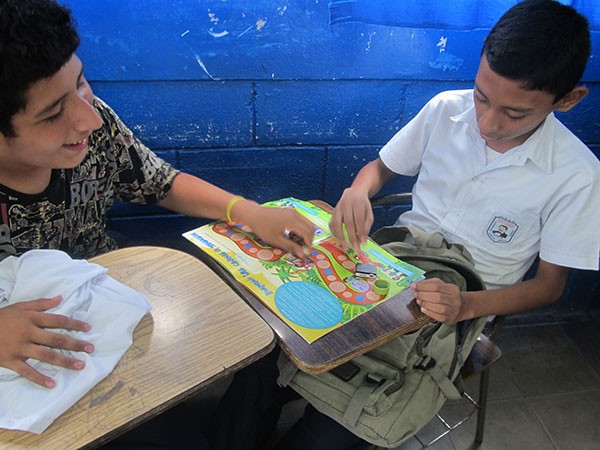Water and sanitation professionals work tirelessly to improve health, promote food security, and boost livelihoods. To further USAID’s knowledge sharing goals, the Water Office holds learning events that present solutions and challenges common to water programs. In Currents, we share the solutions discussed at the events and other forums. Email us at waterteam@usaid.gov if you would like your project to be considered for Global Waters.
Grand Challenge For Development Harnesses Technology To Improve Agricultural Water Use

Over 70 percent of the world’s water is used for growing and producing food. Experts estimate that by 2025, two-thirds of the world's population may be impacted by water shortages stemming from climate change and other environmental factors. These shortages will impact farmers’ abilities to produce enough food to eat, feed their families, and earn a living.
The USAID Water and Development Strategy calls for leveraging science and technology to promote efficient water use in agriculture. To this end, USAID has teamed up with the Swedish International Development Agency (Sida) to find and harness more sustainable and scalable solutions to the global water crisis.
On September 2, 2013, at the opening session of World Water Week, the partners announced Securing Water for Food: A Grand Challenge for Development. This $25 million challenge aims to identify and bring to scale promising new innovations that use existing water resources more efficiently, improve water capture and storage technology, and reduce salinity of existing resources to provide new sources of water for agricultural production.
The Grand Challenge is accepting applications until January 17, 2014 for technical and business model innovations with the power to address water challenges in the developing world. The founding partners will select up to 40 winners who will receive funding and acceleration support to scale up their business ventures.
To learn more, visit The Grand Challenge website and follow @securingwater on Twitter.
Project Wet Foundation Promotes Hygiene In Latin American Schools
Sustainable behavior change is key to improving public health. The Project WET Foundation uses its expertise in water education to customize WASH education materials that facilitate behavior change in communities.
Using Project WET’s USAID-sponsored WASH education interventions in 15 African countries as a model, the U.S.-based nonprofit worked with UN HABITAT to develop human values-based WASH education in Bolivia, Colombia, El Salvador, Mexico, and Peru. The materials were customized for local audiences through on-the-ground workshops and translated into Spanish. The curriculum was implemented using a train-the-trainer model and reached approximately 3,000 teachers and 100,000 students.
Evaluations showed 93 percent of teachers who used the educational materials saw an increase in the number of students who improved their hygiene habits and conserved water. Teachers also reported that students exhibited a greater understanding of water resources and showed more compassion and care for the environment.
Small demonstration projects to show how WASH education can empower meaningful local action were also part of the curriculum. Teachers from the pilot countries submitted applications to carry out action projects via a Spanish-language Internet educators’ portal, and projects in Bolivia and El Salvador were selected. In El Salvador, a school director who was trained to use Project WET’s WASH education materials used the grant to upgrade the school’s food preparation, sanitation, and drinking water facilities. Project WET is currently applying their model to a similar WASH and solid waste management education program in Rio de Janeiro, Brazil.
To learn more, visit the Project WET website.
Africa Biodiversity Collaborative Group Establishes Freshwater Conservation Guidelines
Water, livelihoods, and the environment are intimately related. In places like sub-Saharan Africa, where 40 percent of the population lacks access to improved drinking water sources, holistic approaches that strengthen the link between freshwater conservation and WASH initiatives are needed to improve access to potable water, reduce poverty, and promote green growth.
Recognizing this need, two members of the Africa Biodiversity Collaborative Group (ABCG), Conservation International and The Nature Conservancy, led the charge along with non-governmental organizations, academics, USAID, and other donors to produce “Freshwater Conservation and Water, Sanitation, and Hygiene (WASH) Integration Guidelines: A Framework for Implementation in sub-Saharan Africa”.
Many WASH and conservation practitioners contributed to the guidelines’ development and technical review, including Absolute Options, African Wildlife Foundation, Catholic Relief Services, Conservation International, FHI360, Global Environment & Technology Foundation, The Nature Conservancy, Natural Resource Defense Council, Millennium Water Alliance, USAID, U.S. Forestry Service, Water for People, WASH Advocates, Wetlands International, the Woodrow Wilson International Center for Scholars, Winrock International, World Vision, and World Wildlife Fund.
The guidelines provide direction to health, development, and conservation professionals in sub-Saharan Africa on how to plan, coordinate, develop, and achieve mutually supported WASH and freshwater conservation outcomes. The guidelines draw on the evidence base and lessons learned from integrated projects referenced in the 2012 ABCG publication, "Linking Biodiversity Conservation and Water, Sanitation, and Hygiene: Experiences from sub-Saharan Africa” and a workshop held in May 2013 to improve the understanding of the value of integrated programs and gather inputs.
The guidelines are available on ABGC’s website.







Comment
Make a general inquiry or suggest an improvement.